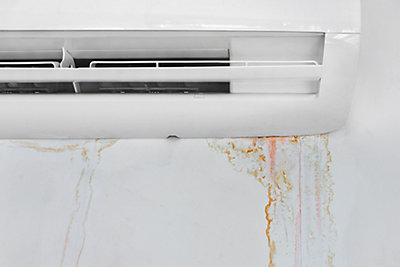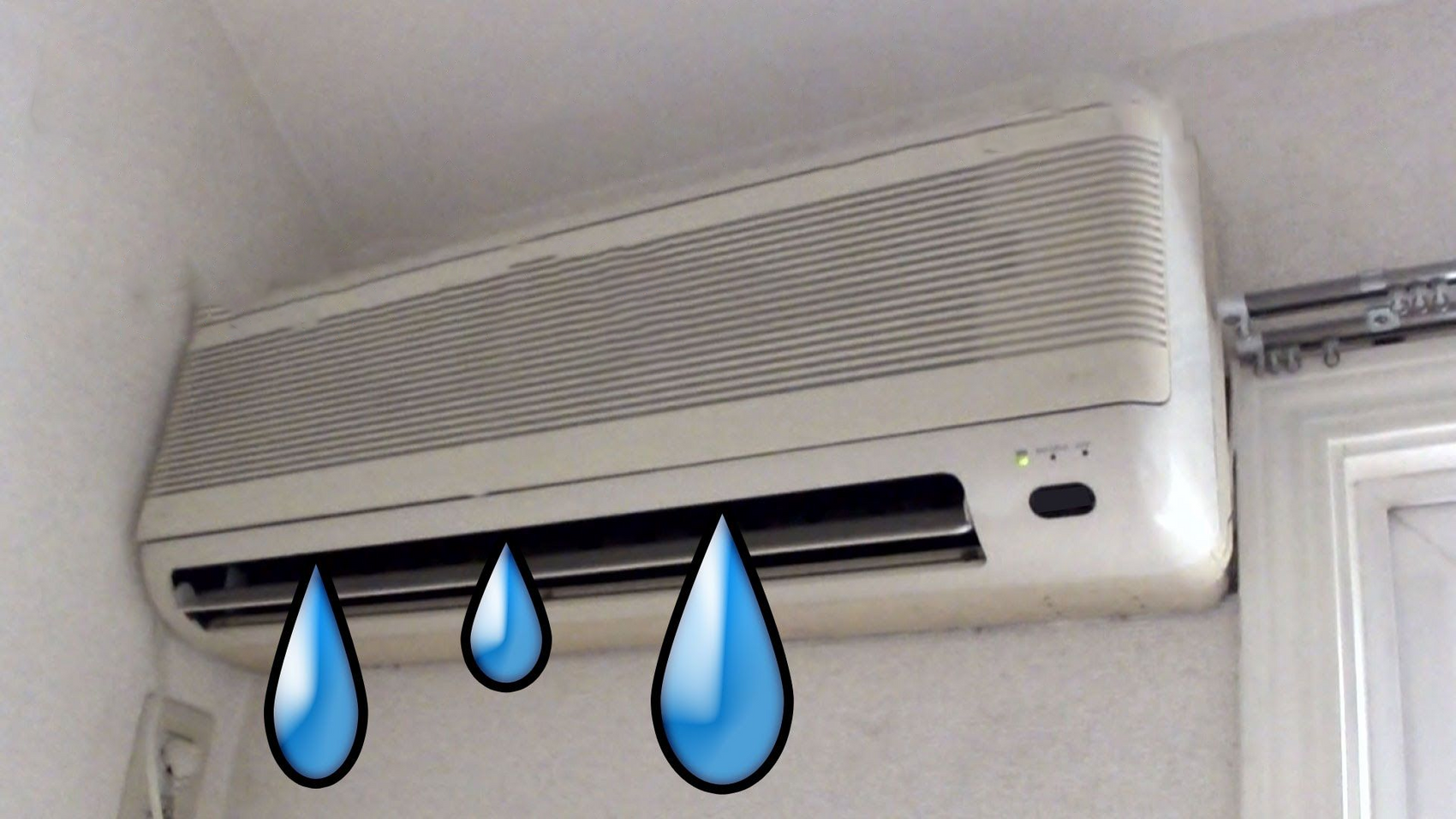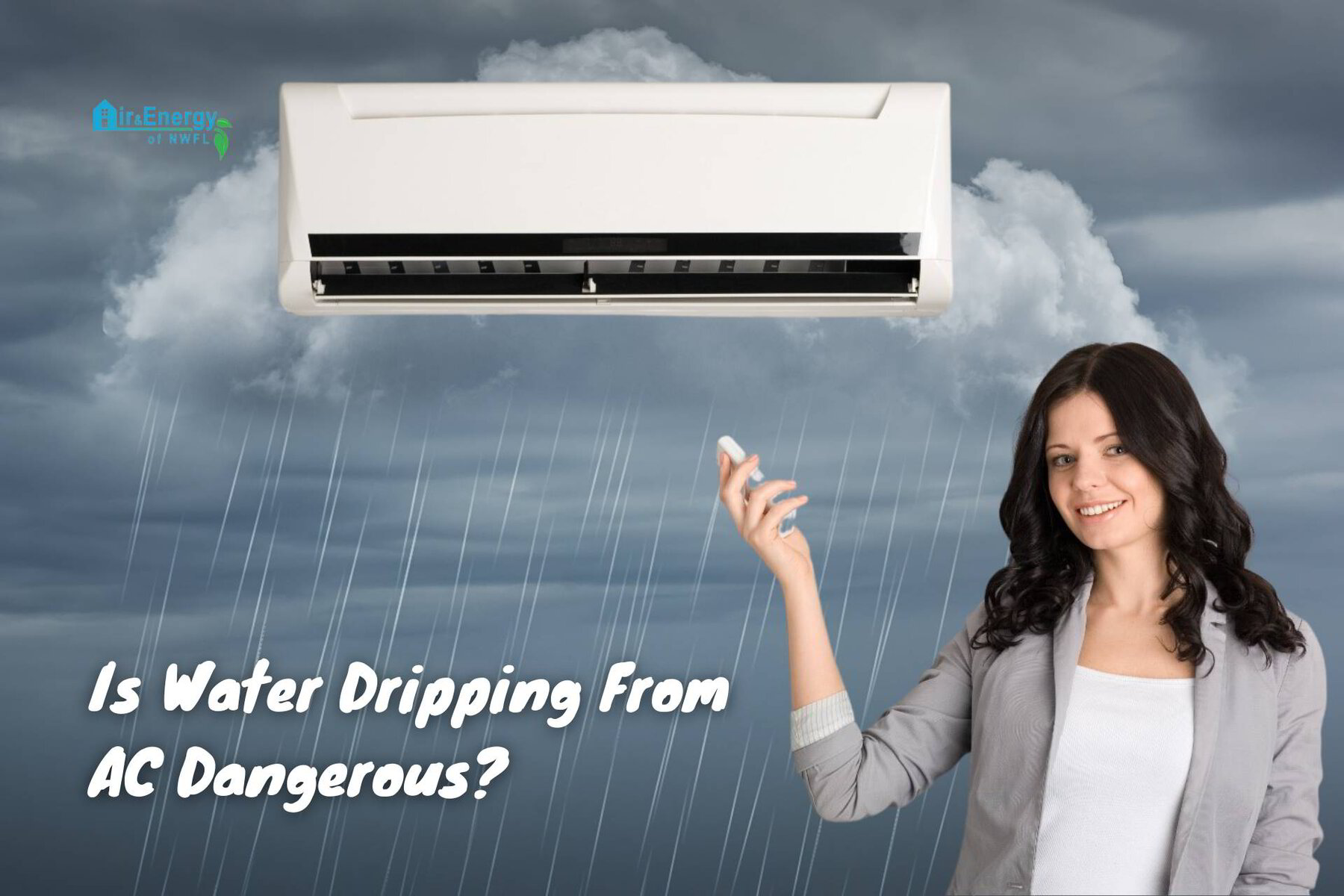Have you ever noticed water pooling around your air conditioner and wondered if it’s a sign of something more serious? You’re not alone.
Many people overlook this seemingly minor issue, thinking it’s just a normal part of their AC’s operation. But is it really harmless, or could it lead to bigger problems for your home and health? We’ll uncover the truth behind water leaks from air conditioners and explore whether they pose any danger to you and your family.
By the end, you’ll know exactly what to watch for and how to keep your cooling system running safely and efficiently. Stay with us to discover how a simple leak could be the tip of the iceberg.

Credit: www.servicechampions.net
Common Causes Of Water Leaks
Water leaking from air conditioners is a common issue. It can cause damage if not addressed promptly. Understanding the causes can help prevent leaks. Here are some reasons why air conditioners might leak water.
Blocked Drain Pipes
Drain pipes remove condensation from the unit. Dust and debris can clog these pipes. When pipes are blocked, water backs up and leaks. Regular cleaning keeps pipes clear and functioning.
Improper Installation
Installation mistakes lead to water leaks. A tilted air conditioner might not drain properly. Ensure the unit is level for effective drainage. Professional installation avoids these issues.
Low Refrigerant Levels
Low refrigerant affects the cooling system. It can cause the evaporator coil to freeze. When the ice melts, water leaks from the unit. Checking refrigerant levels prevents this problem.
Potential Hazards Of Water Leaks
Water leaks from your air conditioner might seem harmless, but they can lead to various hazards that you should not ignore. These leaks are not just a nuisance; they can pose significant risks to your home and health. Understanding these potential dangers is crucial for taking timely action.
Electrical Risks
Water and electricity are a dangerous combination. If water leaks from your air conditioner, it can drip onto electrical components, leading to short circuits or even fires. Imagine the surprise of finding out that a small leak caused damage to your electrical system.
It’s vital to ensure that all electrical outlets and devices near the AC unit are safeguarded from moisture. Regular inspections can help you identify and fix leaks before they escalate into costly repairs or hazardous situations.
Structural Damage
Persistent water leaks can weaken the structural integrity of your home. Water seeping into walls or ceilings can lead to sagging, cracks, or even collapse over time. Have you checked the areas around your air conditioner for dampness or discoloration?
If you notice any signs of water damage, act promptly. Addressing leaks early can save you from extensive repairs and preserve the value of your property. Protect your home by being vigilant about any water leaks.
Mold And Mildew Growth
Water leaks create a perfect breeding ground for mold and mildew. These fungi thrive in damp environments and can spread quickly, affecting your indoor air quality. Have you ever experienced musty odors or noticed mold spots around your AC unit?
Mold can cause respiratory issues and allergies, impacting your family’s health. To prevent mold growth, ensure your air conditioner is regularly serviced, and any leaks are promptly repaired. Consider investing in a dehumidifier to reduce moisture levels in your home.
Do you want to gamble with your safety and property value? Water leaks from your air conditioner can be dangerous, but with proactive measures, you can mitigate these risks. Regular maintenance and vigilance are your best allies in keeping your home safe and sound.
Health Concerns Linked To Mold
Water leaking from air conditioners can create mold. Mold leads to health issues like allergies and respiratory problems. Address leaks quickly to prevent mold growth and protect health.
Water leaking from air conditioners may seem like a minor issue, but it can lead to serious health concerns if not addressed. Mold thrives in damp environments, and a leaky AC provides the perfect breeding ground. Mold exposure can affect your health in various ways, and it’s crucial to understand the potential risks to protect yourself and your family.
Respiratory Issues
Breathing in mold spores can irritate your lungs. You might experience symptoms like coughing, wheezing, or a sore throat. If you have asthma, mold exposure can trigger attacks, making breathing even more difficult.
Allergic Reactions
Mold can also cause allergic reactions. You may notice sneezing, runny nose, or itchy eyes. Even if you don’t have allergies, prolonged exposure can lead to sensitivities over time.
Impact On Immunocompromised Individuals
People with weakened immune systems need to be extra cautious. Mold exposure can lead to severe infections or worsen existing health issues. If someone in your home is immunocompromised, addressing AC leaks swiftly becomes even more critical. Have you ever noticed these symptoms and wondered if they might be linked to your air conditioner? Regular maintenance and prompt repairs can prevent leaks and protect your health. Don’t let a simple leak become a big problem.

Credit: aloraircrawlspace.com
Preventive Measures
Water leaking from air conditioners can lead to mold growth and structural damage. Regular maintenance helps prevent these issues. Ensure proper drainage and check for blockages to keep your environment safe and comfortable.
Water leaking from your air conditioner can be more than just a minor inconvenience. It could signal underlying issues that might lead to bigger problems. By implementing preventive measures, you can not only avoid the mess but also ensure your AC unit runs efficiently, saving you time and money.
Regular Maintenance
Regular maintenance is key to preventing water leaks from your air conditioner. Make it a habit to check the filters and clean them every month. A clogged filter can cause the evaporator coil to freeze and then leak water when it melts. Keep the condenser unit free from dirt and debris. This allows proper airflow and prevents blockages. A well-maintained unit is less likely to develop leaks.
Professional Inspection
Having a professional inspect your AC unit at least once a year is crucial. Professionals can spot issues you might overlook, like small cracks or worn-out parts that could lead to leaks. This annual check-up can catch problems early, saving you from costly repairs. It’s like a health check for your AC, ensuring it runs smoothly and efficiently.
Proper Installation Techniques
Proper installation from the start can prevent many common issues, including leaks. If you’re installing a new unit, ensure it’s placed on a stable surface to avoid shifting that could lead to leaks. Make sure the drainage system is correctly set up. An improperly installed drain line can cause water to back up and leak. Don’t hesitate to ask your installer questions to ensure everything is in order. Taking these preventive measures can save you from the hassle of dealing with water leaks. Are you ready to invest a little time in maintaining your AC for long-term peace of mind?
When To Seek Professional Help
Water leaks from air conditioners can seem minor at first. But they might indicate a bigger problem. Identifying when to seek professional help is crucial. Some issues need expert attention. Ignoring them can lead to costly repairs.
Persistent Leaks
Persistent leaks are a red flag. They suggest a deeper problem. A clogged drain line often causes these leaks. Professional inspection is necessary. An expert can clear the blockage. Persistent leaks can damage your home. Address them promptly.
Signs Of Mold
Mold growth is a serious concern. It often follows water leaks. Mold affects air quality. It poses health risks. Look for musty smells. Discolored patches near the AC are also signs. Call a professional if you suspect mold. They can safely remove it.
Electrical Hazards
Water and electricity do not mix. Leaks near electrical components are dangerous. They increase the risk of electrical shock. Professionals handle these situations safely. They can inspect and repair any damage. Never attempt these repairs alone.
Diy Solutions For Minor Leaks
Water leaking from air conditioners often indicates minor issues. Left unchecked, these leaks can cause electrical hazards or mold growth. Simple DIY solutions can help fix minor leaks and prevent potential dangers.
If your air conditioner drips water, you might worry. Small leaks usually aren’t dangerous. You can try some DIY solutions before calling a professional. These easy steps might save you time and money.
Clearing Blocked Pipes
Water leaks often occur when pipes are blocked. Dust and dirt can clog the drainage system. Clear the blockage with a thin brush or pipe cleaner. Ensure the pipe is free of debris. This might solve the leak problem.
Adjusting Installation
An air conditioner needs proper installation. If it’s not level, water might leak. Use a spirit level to check. Adjust the unit so it sits straight. This can help stop leaks.
Monitoring Refrigerant Levels
Low refrigerant levels can cause leaks. Check the levels regularly. If levels are low, call a technician. They can refill the refrigerant properly. This ensures the unit works smoothly. These DIY solutions are a good start. They might fix minor leaks. But if leaks persist, seek professional help.

Credit: airandenergynwfl.com
Frequently Asked Questions
Is Water Leakage From Ac Hazardous?
Water leakage isn’t directly dangerous. But it can cause mold growth. Mold affects indoor air quality.
Can A Leaking Ac Cause Health Issues?
Yes, mold from water leaks can trigger allergies. It may worsen asthma symptoms. Keep your environment safe.
What Causes Water To Leak From Air Conditioners?
Clogged drain lines or broken condensate pumps often cause leaks. Regular maintenance can prevent these issues.
How Do I Fix A Leaking Air Conditioner?
Clean the drain line. Check the condensate pump. If unsure, consult a technician. Early action helps avoid damage.
Is Water Leaking From Ac A Sign Of A Bigger Problem?
Sometimes, yes. It might indicate poor maintenance. It could also mean a broken part. Regular check-ups are crucial.
Conclusion
Water leaking from air conditioners requires attention. Ignoring it can cause damage. Mold growth is a risk. It affects health and air quality. Check for blockages or faulty parts. Regular maintenance helps prevent issues. Address leaks promptly to avoid problems.
Call a professional if needed. Protect your home environment. Ensure your air conditioner works efficiently. Enjoy a safer, healthier living space. Stay proactive with appliance care. Keep air conditioners in top condition. Your peace of mind depends on it. Always prioritize safety in your home.





